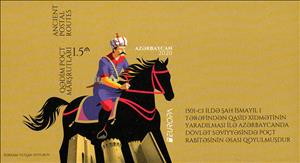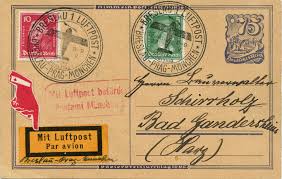Souvenir Sheet: Postrider (Azerbaijan 2020)
Postrider (Azerbaijan 2020)
28 July (Azerbaijan ) within release Europa (C.E.P.T.) 2020 - Ancient Postal Routes goes into circulation Souvenir Sheet Postrider face value 1.50 Azerbaijani manat
| Souvenir Sheet Postrider in catalogues | |
|---|---|
| Michel: | Mi: AZ BL254B |
Souvenir Sheet is horizontal format.
Imperforate at bottom.Also in the issue Europa (C.E.P.T.) 2020 - Ancient Postal Routes:
- Souvenir Sheet - Postrider face value 1.50;
- Stamp - Postrider and Map face value 0.50;
- Stamp - Postrider and Map face value 0.60;
- Full Pane - Postrider and Map face value 12*0.50;
- Full Pane - Postrider and Map face value 12*0.60;
- Booklet - Europa (C.E.P.T.) 2020 - Ancient Postal Routes face value 4.40;
- Booklet Pane - Europa (C.E.P.T.) 2020 - Ancient Postal Routes face value 4.40;
- Tete-Beche - Europa (C.E.P.T.) 2020 - Ancient Postal Routes face value 1.10;
- Se-tenant - Europa (C.E.P.T.) 2020 - Ancient Postal Routes face value 1.10;
- Se-tenant - Europa (C.E.P.T.) 2020 - Ancient Postal Routes face value 1.10;
- Se-tenant - Europa (C.E.P.T.) 2020 - Ancient Postal Routes face value 1.10;
- Se-tenant - Europa (C.E.P.T.) 2020 - Ancient Postal Routes face value 1.10;
- Stamp - Europa (C.E.P.T.) 2020 - Ancient Postal Routes face value 1.50;
- Tete-Beche - Europa (C.E.P.T.) 2020 - Ancient Postal Routes face value 1.10;
- Se-tenant - Europa (C.E.P.T.) 2020 - Ancient Postal Routes face value 1.10;
- Se-tenant - Europa (C.E.P.T.) 2020 - Ancient Postal Routes face value 1.10;
- Se-tenant - Europa (C.E.P.T.) 2020 - Ancient Postal Routes face value 1.10;
- Se-tenant - Europa (C.E.P.T.) 2020 - Ancient Postal Routes face value 1.10;
Souvenir Sheet Postrider it reflects the thematic directions:
Animals are multicellular, eukaryotic organisms of the kingdom Animalia (also called Metazoa). All animals are motile, meaning they can move spontaneously and independently, at some point in their lives. Their body plan eventually becomes fixed as they develop, although some undergo a process of metamorphosis later on in their lives. All animals are heterotrophs: they must ingest other organisms or their products for sustenance.
The horse (Equus ferus caballus) is one of two extant subspecies of Equus ferus. It is an odd-toed ungulate mammal belonging to the taxonomic family Equidae. The horse has evolved over the past 45 to 55 million years from a small multi-toed creature, Eohippus, into the large, single-toed animal of today. Humans began to domesticate horses around 4000 BC, and their domestication is believed to have been widespread by 3000 BC. Horses in the subspecies caballus are domesticated, although some domesticated populations live in the wild as feral horses. These feral populations are not true wild horses, as this term is used to describe horses that have never been domesticated, such as the endangered Przewalski's horse, a separate subspecies, and the only remaining true wild horse. There is an extensive, specialized vocabulary used to describe equine-related concepts, covering everything from anatomy to life stages, size, colors, markings, breeds, locomotion, and behavior.
Postal history is the study of postal systems and how they operate and, or, the study of the use of postage stamps and covers and associated postal artifacts illustrating historical episodes in the development of postal systems. The term is attributed to Robson Lowe, a professional philatelist, stamp dealer and stamp auctioneer, who made the first organised study of the subject in the 1930s and described philatelists as "students of science", but postal historians as "students of humanity". More precisely, philatelists describe postal history as the study of rates, routes, markings, and means (of transport).
The mail or post is a system for physically transporting documents and other small packages; or, the postcards, letters, and parcels themselves. A postal service can be private or public, though many governments place restrictions on private systems. Since the mid-19th century national postal systems have generally been established as government monopolies with a fee on the article prepaid. Proof of payment is often in the form of adhesive postage stamps, but postage meters are also used for bulk mailing. Modern private postal systems are typically distinguished from national postal agencies by the names "courier" or "delivery service". Postal authorities often have functions other than transporting letters. In some countries, a postal, telegraph and telephone (PTT) service oversees the postal system, in addition to telephone and telegraph systems. Some countries' postal systems allow for savings accounts and handle applications for passports.




